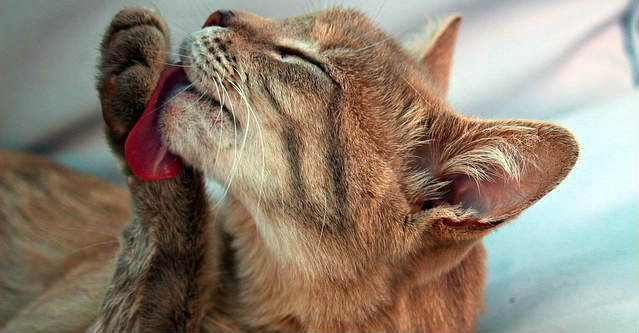What are some tips on how to stop your cat from over-grooming?
Original Question: Hello. I have a question about my cat. He has recently started to lick and sometimes bite his fur to the point where he now has several bald spots. He has a big one in his belly and some on his legs. I'm just wondering if this behaviour is due to allergies or if he is doing it because of anxiety. Thanks so much. - Stephanie
 Oct 9, 2017
Oct 9, 2017
Hi Stephanie,
Thanks for your question.
I find it interesting that you mention anxiety because that was my first thought. There is a common condition called ‘psychogenic alopecia’. It means the loss of hair for a psychological/behavioral reason. It’s very common for cats to become anxious.
Before we assume this diagnosis and get into how to stop your cat from over grooming, it’s important that we rule out other causes of hair loss in cats. I would recommend you first have your veterinarian perform a ‘skin scraping’. This is a quick and inexpensive ‘in clinic’ test that looks for entities such as parasites, bacteria and yeast on the skin. A fungal culture for ringworm would be ideal as well as this is known to cause semi-circular areas of hair loss. To gain an actual diagnosis, you would have to them move to a skin biopsy to determine the exact cause but if the aforementioned tests are negative, I often offer a treatment trial for psychogenic alopecia because it is the most likely diagnosis given the negative test results. If you determine that the hair is ‘barbered’, it furthers supports the diagnosis of psychogenic alopecia. Barbered hair is present if you find individual hairs of different lengths. This means that the hair was licked off or broken. If hair loss in cats is due to disease, then the individual hairs are often the same length because they fall out at the same time. If it were an allergy or immune condition, which does occur in cats, it would likely take a skin biopsy to be certain.
Psychogenic alopecia is behavioral but still has causes and influences. A change in a cat’s environment can be very stressful for them and they can start licking the hair out. They can do it so significantly that they can even open up the skin and create lesions. The most common pattern of hair loss is on the belly.
The first item of treatment is to try and identify and remove the source of stress. It could be a change in the environment such as noise, a family member visiting, new furniture, to name a few. Cats are very in tune with their environment and when it changes, it can really bother them. Overweight cats are prone to stress just due to their size. If your cat is overweight, I recommend you work with your veterinarian on creating a diet for weight loss. If lack of stimulation is a contributing factor, you could try engaging your cat more with active play, using a laser light, adding toys, hiding treats around the house among other things.
If that is not working you can try natural anti-anxiety supplements that you could find in a local pet supply store or your veterinary office. If the condition is serious enough then you can consider medication which is very effective with this condition. I’ve used a medication called Clomipramine or Fluoxetine which helps tremendously in most cases and is very safe. I try not to recommend drugs for over grooming in cats or behavioral modification because most people have a natural unease with this plan, but in cases where the anxiety is really impacting your cat’s quality of life in a negative way, I think it is very important to consider.
I hope this helps. Good luck!
Dr. Clayton Greenway


Disclaimer: healthcareforpets.com and its team of veterinarians and clinicians do not endorse any products, services, or recommended advice. All advice presented by our veterinarians, clinicians, tools, resources, etc is not meant to replace a regular physical exam and consultation with your primary veterinarian or other clinicians. We always encourage you to seek medical advice from your regular veterinarian.

